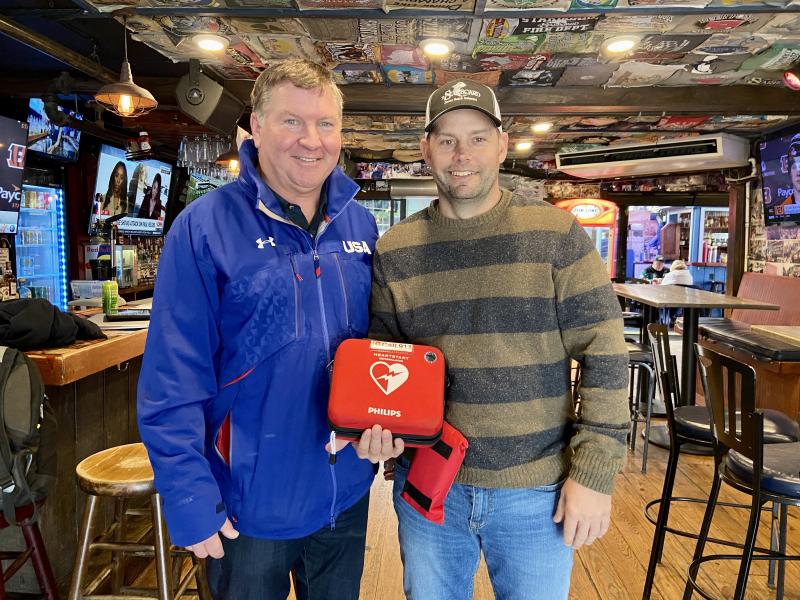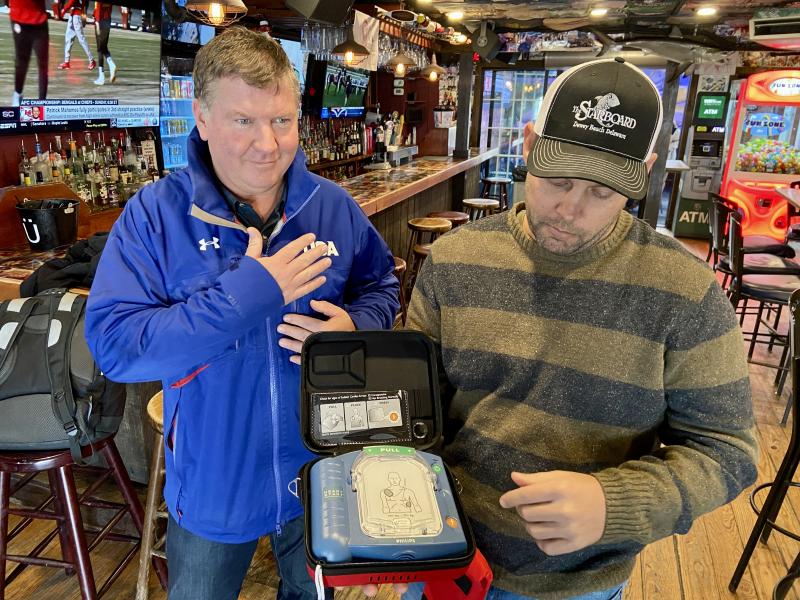Medical staff on duty at The Starboard
When most people think of going to The Starboard, they envision cold beverages, filling meals and live music.
What many patrons don’t know is that restaurant staff are trained not only in customer service and food preparation, but in the use of life-saving devices and procedures as well.
“I employ three EMTs, so we have really good medical coverage here,” said owner Steve “Monty” Montgomery.
Night Manager Josh Keil is one of them. A 23-year lifeguard, Keil struck up a working relationship with Montgomery while he was a Dewey Beach Patrol lieutenant.
For many years, Keil has also been a career EMS/firefighter and EMT/firefighter with Rehoboth Beach Volunteer Fire Company; The Starboard has annually donated equipment and funds to both agencies.
So, when Montgomery contacted Keil six years ago to propose hiring EMTs at The Starboard, it seemed a natural fit for Keil, who had previously worked in security in other bars.
“When you work in this bar, you do a little bit of everything,” Keil said, noting the restaurant attracts a variety of clientele, including families with small children, elderly customers and those with health conditions.
All bouncers and managers are certified in CPR and AED use, Keil said, and bouncers are also instructed in mitigation techniques. EMTs must recertify every two years in Delaware, he said.
The Starboard purchased its AED last summer, and trained staff have used it three times since then, Keil said. The device provides clear instructions for its use, and will only prompt the use of an electric shock if it determines it is needed based on the heart rhythm of a person in cardiac arrest.
Laura Ashby, whose son Dave died of sudden cardiac arrest at age 28, recently donated several AEDs to local establishments, including Starboard Raw, from proceeds raised through the Dave’s Dewey Dash 5K Walk/Run she launched in his memory.
Having the devices in other restaurants would be great, Ashby said, noting that Delaware's Good Samaritan law protects people who render emergency care or rescue assistance in good faith.
“Having them close by and easily accessible is imperative,” Ashby said.
AEDs cost about $1,500 each, she said, and batteries and pads must be replaced regularly. Pads are good for two years and run about $70 per set, while batteries cost about $175 and can last several years.
“For every minute that an individual remains in cardiac arrest, his chance of survival drops by 10%,” Ashby said. “The overall survival rate is a dismal 3% to 5% if the only action taken is calling 911.”
If 911 is called and CPR initiated, Ashby said, survival can double to 6% to 10%.
“But if 911 is notified, CPR is begun, and an early shock is delivered from an AED, the chances of survival can be well over 50%” she said.
For less serious medical issues, Keil maintains a first-aid kit so he can do blood pressure checks and care for injuries and cuts.
Most health-related incidents involve loss of consciousness in the heat of the summer, he said, when patrons faint from dehydration or other medical conditions.
“People come to The Starboard and want to feel safe, protected and watched over,” Keil said. “We want people to end the night happy.”
Montgomery agreed.
“The Starboard is a lot of things to a lot of people, and The Starboard is also a way of life for lots of people,” Montgomery said. “To have medical people on our staff is definitely reassuring. There’s really nothing we would not do to be fully prepared.”




















































